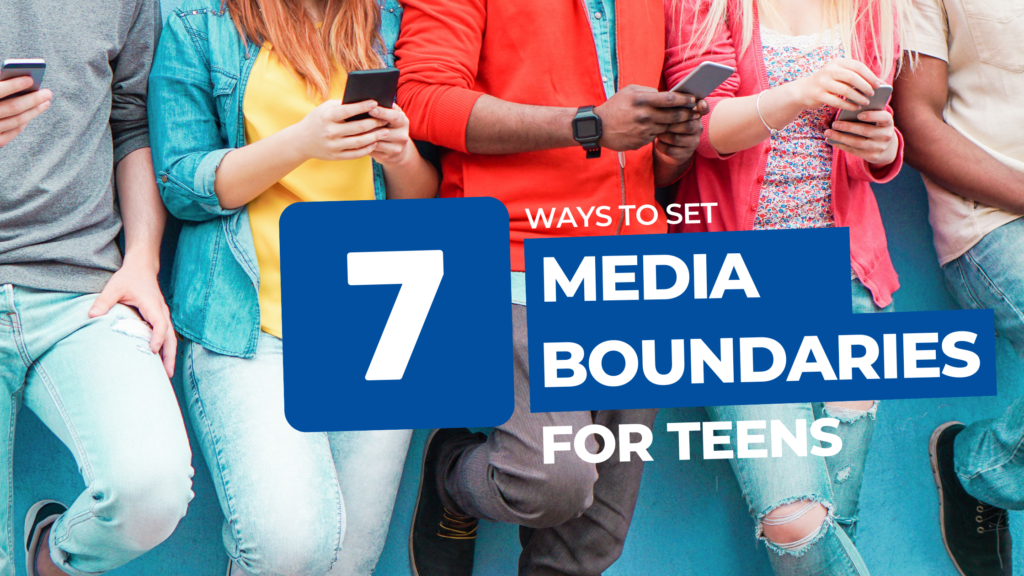At House of Hope, one of the first things we do when a teen arrives at one of our residential facilities is to request that all devices be turned over to our staff.
Why?
Because media has a profound impact on the mindset of a teenager.
On average, teens use technology for a mind-boggling 9 hours each day. That means media influences teenagers more than parents, schools, and churches. And not for the better.
High use of technology by teens is linked to higher instances of depression, anxiety, low self-esteem, and rebelling against authority, to name a few. So limiting its use is not optional—but essential to raising good teens.
Still, parents have all struggled to figure out how to do this. That’s why we’ve put together these 7 Ways to Set Media Boundaries for Teens.
1. Hold Off on Providing Devices
Devices have become so prevalent today that many parents are serving technology to their children as young as age 2!
While most parents issue a cell phone to their children at some point for the purpose of communication, smartphones serve up much more than the ability to contact Mom and Dad. There are endless temptations and opportunities to connect with others, as well, and cell phone use requires limits and boundaries to prevent the damaging effects of exposure to today’s media.
Many parents wait until a child is 16 years old and driving to allow a cell phone. Others may consider providing a phone upon entry into high school, depending on the situation. The longer you can hold off on providing devices, the better. The risks are real, and the potential harm is tremendous.
When a teen is on their phone, they’re doing less of other activities like sports, reading, homework, or connecting with family and friends in person.
Our advice?
Hold off as long as you can on offering your teens devices. Once you do, set time limits (there are apps that do this that you control from your own phone) and establish boundaries.
And if your kiddo is complaining about what they aren’t allowed to have or do, remember, it’s ok to say no—YOU are the parent!
2. Limit the Use of Devices to a Common Area
With all the dangers the internet presents, monitoring its use is wise parenting.
One way to ensure you know what is happening with your teens online is to limit the use of devices to a common area like the kitchen or living room. There is an element of accountability present when anyone can see your activity at any time.
You can also implement time limits on devices (i.e., We all turn our devices into the media basket in the kitchen by 9:00 p.m.—including parents!)
3. Install a Filter on Your Wi-Fi
It would be great to assume that everything on the internet is safe or that our children will always make perfect choices in this area—but we all know better.
It is essential to “watch over the affairs of [your] household” (Proverbs 31:27), and one of the ways to do this is by taking the time to install a filter on your wi-fi system. Filters like Gryphon keep pornography and other content out of every device. It also allows you to monitor what each device views through an app on your phone. You can also implement time limits and cut-off times in the evening for internet use.
4. Monitor What Your Teen is Looking At
Once a filter has been installed, it can be tempting to believe everything is covered. But your job is not done. It is critical that you continually monitor what your teen is viewing.
Here are some practical ways to do this:
- Use the parental controls on the television and streaming services
- Use a free service like Plugged In to assess the content of movies, TV, and video games before your teen is exposed.
- Use a whole-house internet filter as mentioned above.
- Conduct random phone/computer checks. As a parent, you can walk into your teen’s room and ask to see what they’re viewing at any time—even when there are intense objections.
Beyond media, be sure to also pay attention to books your teens are reading, their school curriculum, and the company they keep. “Bad company corrupts good character” is the warning found in 1 Corinthians 15:33. We can define “company” as anyone your teen spends time with—even digitally.
5. Monitor What Your Teen is Listening To
One mom we know had done all the right things. She had taught her kids good morals, taken them to church, and guarded what they watched and read. But at one point, the music her kids listened to had slipped through the cracks.
The result?
A happy kid who had turned into an angry and depressed teenager. After months of despair and frustration, she and her husband finally discovered that their son had been listening to music with angry undertones. Once this media was eliminated from his life, and after working to fill him back up with good thoughts and ideas, he returned to his usual self.
Music is not harmless.
It’s so true, it’s worth repeating. Music is not harmless.
Monitor what your teen is listening to. And, yes, you can put restrictions on it. For example, “In this house, we don’t listen to music with bad language.”
You can track what your teen listens to through your family’s shared music streaming service and also set limits for ratings like language. You can also make random checks when you see or hear your teen listening to music. Don’t let their reaction hinder you from doing what’s right. It’s too important!
6. Limit Social Media Use
A recent study showed that kids and teens who use social media for three or more hours per day are at a higher risk for mental illness. Those are serious consequences!
Today, teens spend far more time watching TikTok and YouTube videos than television programs. So setting media boundaries and limiting social media use for teens is more important now than ever.
Consider setting a boundary regarding social media use in your home that includes the following parameters:
- Social media accounts are used to view posts but not to post personal content.
- Have a conversation about appropriate interactions online and staying away from interacting with strangers
- Encourage your teen to refrain from critical or abusive comments, which are bullying
- Limit social media viewing to one hour per day.
- Follow your teen’s social media accounts to ensure adherence to your guidelines.
Your teen’s emotional health and well-being are far more important than whether they’ve seen the latest posts on Instagram.
7. Ask Questions
Above all, communicate with your teens about what they are listening to and looking at. Ask questions.
And expect answers!
- “What are you listening to?”
- “What are you looking at?”
- “Are you making wise choices online?”
While your questions may seem to pry and may even elicit a frustrated response, deep down, your teen appreciates that you care enough to ask and get involved.
We hope these tips have helped you feel more confident setting media boundaries for your teens. It may take some getting used to—for everyone—but you will forever be grateful you took the time to protect your teens from the adverse effects of media.







